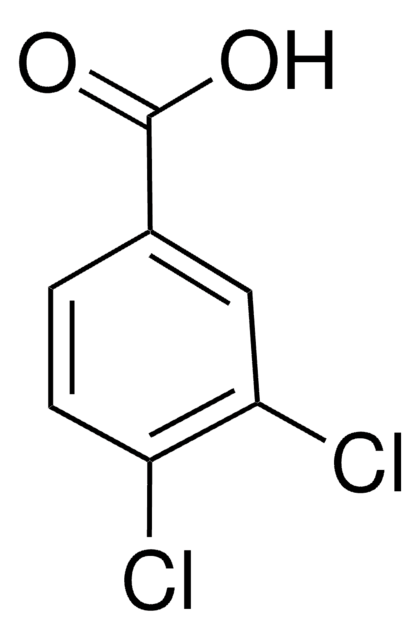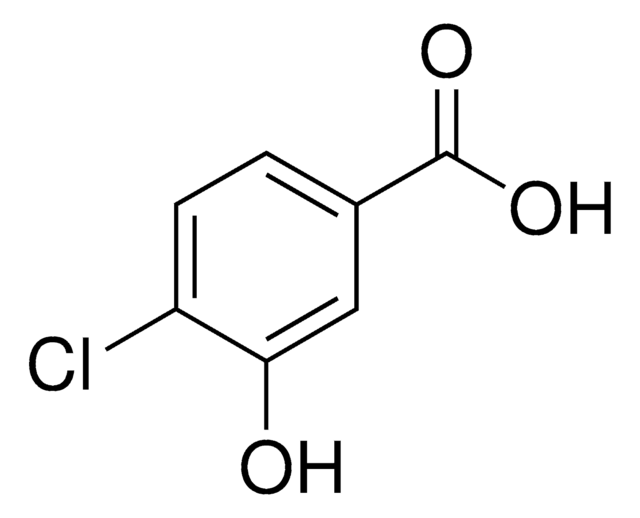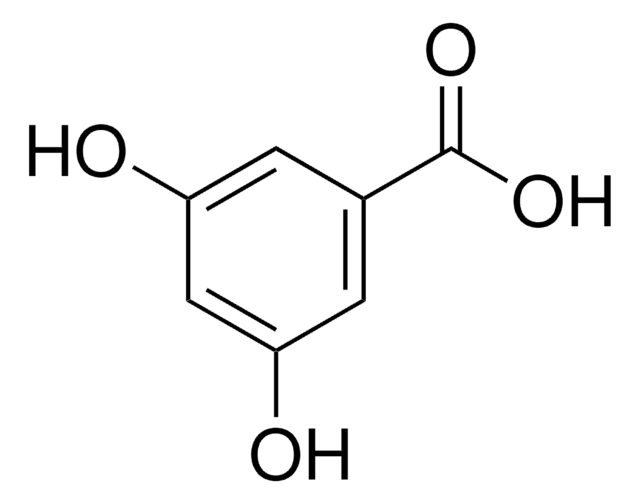All Photos(1)
About This Item
Linear Formula:
ClC6H3(OH)CO2H·1/2H2O
CAS Number:
Molecular Weight:
181.57
EC Number:
MDL number:
UNSPSC Code:
12352100
PubChem Substance ID:
NACRES:
NA.22
form:
powder
Assay:
98%
Recommended Products
Quality Level
Assay
98%
form
powder
mp
171-173 °C (lit.)
SMILES string
O.OC(=O)c1ccc(O)c(Cl)c1.OC(=O)c2ccc(O)c(Cl)c2
InChI
1S/2C7H5ClO3.H2O/c2*8-5-3-4(7(10)11)1-2-6(5)9;/h2*1-3,9H,(H,10,11);1H2
InChI key
VXRQGICSNYPXAC-UHFFFAOYSA-N
Related Categories
Signal Word
Warning
Hazard Statements
Precautionary Statements
Hazard Classifications
Eye Irrit. 2 - Skin Irrit. 2 - STOT SE 3
Target Organs
Respiratory system
Storage Class Code
11 - Combustible Solids
WGK
WGK 3
Flash Point(F)
Not applicable
Flash Point(C)
Not applicable
Personal Protective Equipment
dust mask type N95 (US), Eyeshields, Gloves
Choose from one of the most recent versions:
Certificates of Analysis (COA)
Lot/Batch Number
Don't see the Right Version?
If you require a particular version, you can look up a specific certificate by the Lot or Batch number.
Already Own This Product?
Find documentation for the products that you have recently purchased in the Document Library.
X Zhang et al.
Applied and environmental microbiology, 58(11), 3580-3585 (1992-11-01)
To study the anaerobic degradation of the chimera 3-chloro-4-hydroxybenzoate (3-Cl,4-OHB), anaerobic freshwater sediment samples from the vicinity of Athens, Ga., were adapted for the transformation of 4-hydroxybenzoate (4-OHB), 3-chlorobenzoate (3-CB), 2-chlorophenol (2-CP), and 2,4-dichlorophenol (2,4-DCP). In nonadapted samples, both 4-OHB
R A Sanford et al.
Applied and environmental microbiology, 62(10), 3800-3808 (1996-10-01)
Strain Co23, an anaerobic spore-forming microorganism, was enriched and isolated from a compost soil on the basis of its ability to grow with 2,3-dichlorophenol (DCP) as its electron acceptor, ortho chlorines were removed from polysubstituted phenols but not from monohalophenols.
R H Felton et al.
Biochemistry, 23(17), 3955-3959 (1984-08-14)
Solvent proton nuclear magnetic dispersion studies at 25, 100, and 300 MHz have been performed on protocatechuate 3,4-dioxygenase (PCD) and its complexes with 3-chloro-4-hydroxybenzoate and 3-fluoro-4-hydroxybenzoate. Longitudinal and transverse relaxation rates were measured for these compounds and for the apoenzyme.
T Mester et al.
Applied and environmental microbiology, 63(5), 1987-1994 (1997-05-01)
Aryl metabolites are known to have an important role in the ligninolytic system of white rot fungi. The addition of known precursors and aromatic acids representing lignin degradation products stimulated the production of aryl metabolites (veratryl alcohol, veratraldehyde, p-anisaldehyde, and
F E Löffler et al.
Applied and environmental microbiology, 65(9), 4049-4056 (1999-09-03)
Measurements of the hydrogen consumption threshold and the tracking of electrons transferred to the chlorinated electron acceptor (f(e)) reliably detected chlororespiratory physiology in both mixed cultures and pure cultures capable of using tetrachloroethene, cis-1, 2-dichloroethene, vinyl chloride, 2-chlorophenol, 3-chlorobenzoate, 3-chloro-4-hydroxybenzoate
Our team of scientists has experience in all areas of research including Life Science, Material Science, Chemical Synthesis, Chromatography, Analytical and many others.
Contact Technical Service









